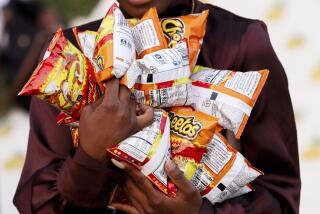FDA to review safety of chemical found in some soft drinks
- Share via
The Food and Drug Administration is reviewing the safety of caramel colorings used in a variety of foods, including colas and other dark soft drinks, to determine whether the agency should act to limit consumers’ exposure to a chemical created during the manufacturing process.
The agency’s announcement Thursday came in response to a Consumer Report investigation that prompted the watchdog group Consumers Union to call for limits on 4-methyliminazole, or 4-Mel, an impurity produced in the production of some caramel colorings, as well as for labeling of products containing caramel coloring.
Consumer Reports on Thursday released a report for which it purchased and conducted lab analyses on 12 different soft drinks purchased multiple times in California and New York over a nine-month period. In two products - Pepsi One and Malta Goya - Consumer Reports said it found levels of 4-Mel that may expose consumers to amounts of the chemical which, under California’s Proposition 65 law, should bear a warning label.
Dr. Urvashi Rangan, a toxicologist and lead author of the Consumer Reports investigation, said “there is no need for consumers to be exposed to this avoidable and unnecessary risk.” His investigation found levels of 4-Mel to be very low in Coca-Cola products - evidence, he said, that the manufacturing byproduct is avoidable. The chemical byproduct 4-methyliminazole has been found to be a “possible human carcinogen” by the International Agency for Research on Cancer.
The FDA noted Thursday that it had studied the use of caramel as a flavor and color additive for decades. Agency spokeswoman Juliann Putnam said the agency “has no reason to believe that 4-Mel, at levels expected in food from the use of caramel colors, poses a health risk to consumers.” But Putnam added that “to ensure the use of caramel colors in food continues to be safe, the FDA is currently testing a variety of foods, including sodas,” to test levels of 4-methylimidazole, and is also reviewing “new data” on the chemical’s safety. Those efforts, Putnam said, will help the FDA determine whether any regulatory action needs to be taken.
In response to the Consumer Reports investigation, PepsiCo defended its products and asserted that their 4-methyliminazole levels do not breach the thresholds for warning labels under Proposition 65. Consumer Reports investigation found levels of 4-methyliminazole in single 12-ounce servings of Malta Goya and Pepsi One that exceeded 29 micrograms - the level beyond which California’s Proposition 65 law requires a warning to consumers.
But PepsiCo cited government consumption data showing the average daily diet soda intake is 100 milliliters a day, or less than a third of a 12-ounce can. By that measure, a consumer would not be exposed daily to 4-Mel levels that require Proposition 65 warnings, and which are widely considered safe, the company said.







